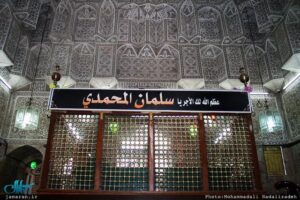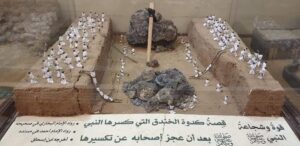
Mawlana Salman al Farsi (as)
مَوْلَانَا سَلْمَان ٱلْفَارِسِيّ (عَلَيْهِ السَّلَامُ)
568 CE – 654 CE /33 AH (disputed)
Birth place: Kazerun or Isfahan, Iran
Resting Place: Salman Pak, Al-Mada’in, Iraq (disputed)
My heart has become capable of all forms:
A pasture for gazelles, a monastery for monks,
A temple for idols, the Kabah of the pilgrims,
The tablets of Torah, the Book of Quran.
I profess the religion of Love.
Whatever direction love’s camels take,
That is my religion and my faith.
—Ibn Arabi, Tarjuman al-ashwaq
Titles of Salman Farsi
Salman al-Farsi (as) stood fast in the face of extreme difficulties and hardships, to carry the Light of Lights and to spread the secrets of hearts, to lift people from darkness to light. He was a noble Companion of the Prophet ﷺ who reported sixty of the Prophet’s ﷺ Traditions (hadith).
 Salman al-Farsi (as) is known as “the Imam (Leader)” “the Inheritor of Islam,” “the Wise Judge,” “the Knowledgeable Scholar” and Ahlul Bayt (One of the House of the Prophet ﷺ).” These were all titles the Prophet ﷺ gave him. [Also, he was known as:
Salman al-Farsi (as) is known as “the Imam (Leader)” “the Inheritor of Islam,” “the Wise Judge,” “the Knowledgeable Scholar” and Ahlul Bayt (One of the House of the Prophet ﷺ).” These were all titles the Prophet ﷺ gave him. [Also, he was known as:
- Al-Farsi (The Persian)
- Al-Muhammadi (Muhammadan)
- Abu Al-Kitabayn (The Father of two books: the Bible and the Holy Quran)
- Luqman Al-Hakeem (the Wise Luqman)
- Paak (Pure)
Abu Hurairah is said to have referred to Salman as “Abu al-Kitabayn” (“the father of the two books”; that is, the Bible and the Quran), and Ali is said to have referred to him as “Luqman al-Hakeem” (“Luqman the wise,” a reference to a wise man mentioned in the Quran). Whenever people inquired about his ancestry, Salman is said to have replied: “I am Salman, the son of Islam from the child of Adam.”]
Birth and early life
[Salman was a Persian born with the name Rouzbeh Khoshnudan in the city of Kazerun in Fars Province, or Isfahan in Isfahan Province of current day Iran. In a hadith, Salman also traced his ancestry to Ramhormoz. The first sixteen years of his life were devoted to studying to become a Zoroastrian magus or priest, after which he became the guardian of a fire temple. Three years later in 587 he met a Nestorian Christian group and was impressed by them. Against the wishes of his father, he left his family to join them. His family imprisoned him afterwards to prevent him but he escaped.
Salman (as) traveled around the Middle East to discuss his ideas with priests, theologians and scholars in his quest for the truth, settling initially in Mosul (ancient Nineveh). During his stay in Syria, he heard of Muhammad, whose coming had been predicted by Salman’s last Christian teacher on his deathbed. Afterwards and during his journey to the Arabian Peninsula, he was betrayed and sold to a Jew in Medina. ]
Secret of Servanthood – to Be in Service to Rasulullah ﷺ }
Salman Farsi (as) came from a highly respected Zoroastrian family from a town near Isfahan. One day while passing by a church, he was attracted by the voices of men praying. Drawn by their worship, he ventured in and found it better than the religion of his upbringing. On learning that the religion originated in Syria, he left home, against his father’s wishes, went to Syria and associated himself with a succession of Christian anchorites. He came to know from them the coming of the Last Prophet ﷺ and the signs accompanying his advent.
He then traveled to the Hijaz (Saudi Arabia) where he was seized, sold into slavery, and taken to Madinah, {Complete and True Servant with no will of his own, allowed himself to be a slave to meet Sayedena Muhammad (s) } where he eventually met the Prophet ﷺ . When he found in the Prophet ﷺ the fulfilment of all the signs of which he had been informed by his Christian teachers, he accepted Islam. Servitude prevented Salman (as) from being at the battles of Badr and Uhud.
The Messenger ﷺ helped him gain his release from slavery by planting, with his own hand, 300 palm trees and giving him a large piece of gold. Once a free man, he took part in every subsequent battle with the Prophet ﷺ.
The Search for the Prophet Muhammad ﷺ
In Ibn Ishaq’s Sirat Rasul Allah, we find the following in Salman’s (as) account to the Prophet ﷺ of his journey in search of the true religion:
Asim ibn Umar ibn Qatada said that he was told that Salman the Persian (as) told the Prophet ﷺ that his master in Ammuriya told him to go to a certain place in Syria where there was a man who lived between two thickets. Every year as he went from one to the other, the sick stood along his way and everyone he prayed for was healed. He said, “Ask him about this religion which you seek, for he can tell you of it.” So I went on until I came to the place of which I had been told. I found that people had gathered there with their sick until he came out to them that night passing from one thicket to the other. The people came to him with their sick. Everyone he prayed for was healed. They prevented me from getting to him. I could not approach him until he entered the thicket to which he was headed. I took hold of his shoulder. He asked me who I was as he turned to me and I said, “God have mercy on you, tell me about the Hanafiya, the religion of Abraham (as).” He replied, “You are asking about something men do not inquire of today. The time has come near when a prophet will be sent with this religion from the people of the sacred area. Go to him, for he will bring you to it.” Then he went into the thicket. The Prophet ﷺ said to Salman (as), “If you have told me the truth, you met Jesus (as) the son of Mary (as).”
His Role in Battle of al-Khandaq
 In one of the Prophet’s ﷺ battles called al-Ahzab or al-Khandaq, Salman (as) advised the Prophet ﷺ to dig trenches around Madinah in defence of the city, a suggestion that the Prophet ﷺ happily accepted. He then went ahead and helped the digging with his own hands. During this excavation, Salman (as) struck upon a rock that he was unable to break. The Prophet ﷺ took an axe and hit it. The first strike brought forth a spark. He then hit it a second time and brought forth a second spark. He then struck for the third time and brought forth a third spark.
In one of the Prophet’s ﷺ battles called al-Ahzab or al-Khandaq, Salman (as) advised the Prophet ﷺ to dig trenches around Madinah in defence of the city, a suggestion that the Prophet ﷺ happily accepted. He then went ahead and helped the digging with his own hands. During this excavation, Salman (as) struck upon a rock that he was unable to break. The Prophet ﷺ took an axe and hit it. The first strike brought forth a spark. He then hit it a second time and brought forth a second spark. He then struck for the third time and brought forth a third spark.
He ﷺ then asked Salman (as), “O Salman, did you see those sparks?” Salman (as) replied, “Yes, O Prophet ﷺ , indeed I did.” The Prophet ﷺ said:
- “The first spark gave me a vision in which God has opened Yemen for me.
- With the second spark, God opened Damascus and al-Maghrib (the West).
- And with the third one, God opened for me the East.”
Salman (as) reported that the Prophet ﷺ said:
- “Nothing but supplication averts the Decree.
- “Nothing but righteousness increases life,” and
- “Your Lord is Munificent and Generous and is ashamed to turn away empty the hands of a servant when he raises them to him.”
At-Tabari recounts that in the year 16 AH/637 CE the Muslim army turned to the Persian front. In order to confront the Persian king at one point, the Muslim army found itself on the opposite bank of the great Tigris River. The commander of the army, Saad ibn Abi Waqqas , following a dream, ordered the entire army to plunge into the rushing river. Many people were afraid and hung back. Saad (ra), with Salman (as) by his side, prayed first, “May God grant us victory and defeat His enemy.” Then Salman (as) prayed, “Islam generates good fortune. By God, crossing rivers has become as easy for the Muslims as crossing deserts. By Him in whose hand lies Salman’s soul, may the soldiers emerge from the water in the same numbers in which they entered it.” Saad (ra) and Salman (as) then plunged into the Tigris. It is reported that the river was covered with horses and men. The horses swam and when they tired the river floor seemed to rise up and support them until they regained their breath. To some it seemed that the horses rode effortlessly on the waves. They emerged on the other bank, as Salman (as) had prayed, having lost nothing from their equipment but one tin cup, and no one having drowned.
They went on to take the Persian capital. Salman (as) acted as spokesman and said to the conquered Persians, “I have the same origin as you. I shall be compassionate toward you.
- You have three options.
- You may embrace Islam, then you will be our brethren and you will have the same privileges and obligations as we.
- Or you may pay the tax of non-Muslims and we will govern you fairly.
- Or we will declare war on you.” The Persians, having witnessed the miraculous crossing of the Muslim army, accepted the second alternative.
Salman al-Farsi (as) was eventually appointed governor of that region. He was the commander of 30,000 Muslim troops. Yet, he was very humble. He lived from his own manual labor. He did not own a house, but instead rested under the shade of trees. He said that he was surprised to observe so many people spending all their life for the lower world, without a thought for the inevitable death which will take them from the world one day.
He was a very strict and just man. Among some spoils that were distributed one day was cloth out of which each Companion had one piece of clothing cut. One day Sayyidina Umar (as) got up to speak and said, “Lower your voices so that you may hear me.” He was wearing two pieces of that cloth. Salman (as) said “By God, we will not hear you, because you prefer yourself to your people.” “How is that?” asked Sayyidina Umar (as). He said: “You are wearing two pieces of cloth and everyone else is wearing only one.” Sayyidina Umar (as) called out. “O Abd Allah!” Abdullah, his son, answered, “At your service!” Sayyidina Umar (as) said, “I ask you by God, do you confirm that the second piece is yours?” Abdullah said, “Yes.” Salman (as) said, “Now we shall hear you.”
Each night he prayed, and when he got tired he would start reciting dhikr with his tongue. When his tongue would get tired, he would contemplate andmeditate on God’s power and greatness in creation. He would then say to himself, “O my ego, you took your rest, now get up and pray.” Then he would recite dhikr again, then meditate, and so forth all night long.
Bukhari relates two Traditions which show the Prophet’s ﷺ consideration for Salman al-Farsi (as).
Abu Hurayra (ra) relates: “While we were sitting with the Holy Prophet ﷺ , Surat al-Jumuah was revealed to him. When the Prophet ﷺ recited the verse, “And He (God) has sent him (Muhammad) also to others (than the Arabs)” (62:3), I said, “Who are they, O God’s Messenger?” the Prophet ﷺ did not reply until I repeated my question three times. At that time Salman al-Farsi (as) was with us. God’s Messenger ﷺ put his hand on Salman (as), saying, “If faith were at the Pleiades, even then some men from these people (i.e. Salman’s folk) would attain it.”
His Brotherhood with Abu Darda (ra)
 Abu Juhayfa (ra) relates: “The Prophet ﷺ made a bond of brotherhood between Salman (as) and Abu ad-Darda al-Ansari. Salman (as) paid a visit to Abu ad-Darda and found Umm Darda (his wife) dressed in shabby clothes. He asked her why she was in that state. She said, “Your brother Abu ad-Darda is not interested in the luxuries of this world.” In the meantime Abu ad-Darda came and prepared a meal for Salman (as). Salman (as) requested Abu ad-Darda to eat with him, but Abu ad-Darda said, “I am fasting.” Salman (as) said, “I am not going to eat unless you eat.” So Abu ad-Darda ate with Salman (as). When it was night and a part of the night had passed, Abu ad-Darda got up (to offer the supererogatory night prayer), but Salman (as) told him to sleep and Abu ad-Darda slept. After some time Abu ad-Darda again got up but Salman (as) told him to sleep. When it was the last hours of the night, Salman (as) told him to get up then, and both of them offered the prayer. Salman (as) told Abu ad-Darda, “Your Lord has a right over you, your soul has a right over you, and your family has a right over you.” Abu ad-Darda narrated the whole story to the Prophet ﷺ . The Prophet ﷺ said, “Salman has spoken the truth.”
Abu Juhayfa (ra) relates: “The Prophet ﷺ made a bond of brotherhood between Salman (as) and Abu ad-Darda al-Ansari. Salman (as) paid a visit to Abu ad-Darda and found Umm Darda (his wife) dressed in shabby clothes. He asked her why she was in that state. She said, “Your brother Abu ad-Darda is not interested in the luxuries of this world.” In the meantime Abu ad-Darda came and prepared a meal for Salman (as). Salman (as) requested Abu ad-Darda to eat with him, but Abu ad-Darda said, “I am fasting.” Salman (as) said, “I am not going to eat unless you eat.” So Abu ad-Darda ate with Salman (as). When it was night and a part of the night had passed, Abu ad-Darda got up (to offer the supererogatory night prayer), but Salman (as) told him to sleep and Abu ad-Darda slept. After some time Abu ad-Darda again got up but Salman (as) told him to sleep. When it was the last hours of the night, Salman (as) told him to get up then, and both of them offered the prayer. Salman (as) told Abu ad-Darda, “Your Lord has a right over you, your soul has a right over you, and your family has a right over you.” Abu ad-Darda narrated the whole story to the Prophet ﷺ . The Prophet ﷺ said, “Salman has spoken the truth.”
From Sayings of Salman Farsi (as):
Sulaiman al-Teemi (ra) narrated that Salman al-Farsi (as) said:
- Nimrod starved out two lions, and then released them to devour God’s bosom friend, Abraham. But when the lions reached him and by God’s leave, they stood before him in reverence, and they both lovingly licked him all over and prostrated themselves at his feet.
- Abi al-Bakhtari narrated that Salman al-Farsi (as) had a female servant of Persian descent and he once spoke to her in her Persian tongue saying, “Prostrate yourself even once before God.” She replied with disdain, “I do not prostrate to anyone!” Someone asked Salman (as), “O Abu Abdullah, what would she benefit from a single prostration?” Salman (as) replied, “Each link is an important part of a chain, and perhaps should this woman accept to offer a single prostration before God Almighty, then this may lead her to regularly engage in offering the five times prayers. In fact, one who has a share in the blessings of Islam is not equal to someone who has naught of it.”
- Sulaiman al-Teemi narrated that Salman al-Farsi (as) said:
If a man spends his entire night freeing slaves from bondage and another man spends his night reading the Quran and invoking the remembrance of God (dhikr), the second man would be in a higher state.
His Passing
Beloved Salman al-Farsi (as) passed away in 33 AH/654 CE during the reign of Uthman. He passed his secret on to Abu Bakr’s grandson, Imam Abu Abdur Rahman Qasim ibn Muhammad ibn Abu Bakr as-Siddiq (as).
Article Updated: Aug 5, 2023
Related Articles:
- Mawlana Qasim ibn Muhammad Ibn Abu Bakr (as)
- meditate on God’s power and greatness in creation
- Wikipedia – Salman al Farsi
Please Donate and support us to spread these heavenly knowledges by clicking the heart button below.
Copyright © 2023 Naqshbandi Islamic Center of Vancouver, All Rights Reserved.














